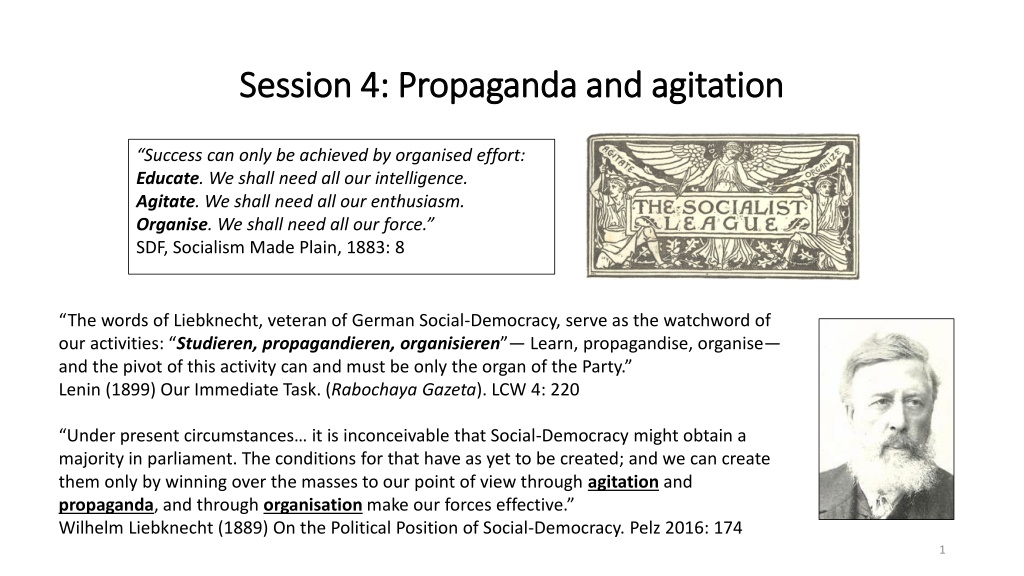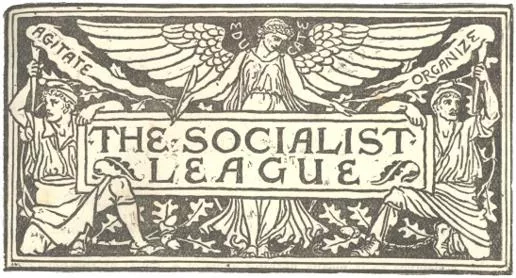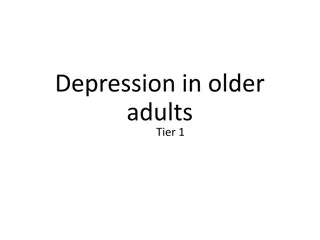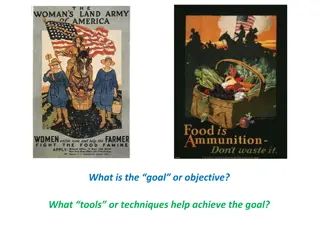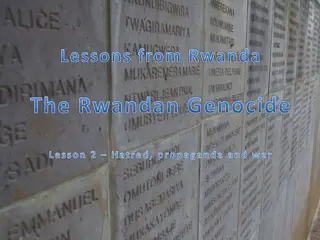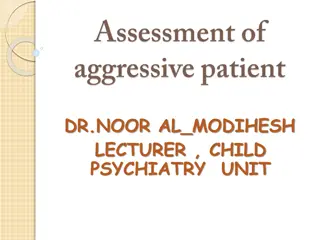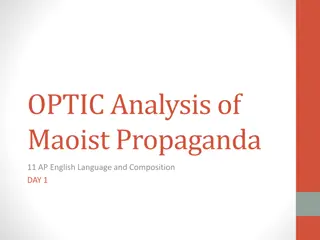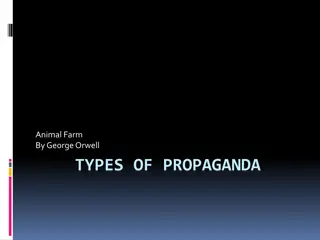Session 4: Propaganda and agitation
In the quest for achieving success through organized effort, this piece delves into the intertwined realms of propaganda and agitation as essential tools in the socialist struggle, emphasizing education, enthusiasm, and effective organization to influence the masses and bring about political change. The discourse navigates through the nuances of propaganda and agitation, highlighting their significance in driving societal transformation and the crucial role they play in shaping historical activism and political power.
Download Presentation

Please find below an Image/Link to download the presentation.
The content on the website is provided AS IS for your information and personal use only. It may not be sold, licensed, or shared on other websites without obtaining consent from the author.If you encounter any issues during the download, it is possible that the publisher has removed the file from their server.
You are allowed to download the files provided on this website for personal or commercial use, subject to the condition that they are used lawfully. All files are the property of their respective owners.
The content on the website is provided AS IS for your information and personal use only. It may not be sold, licensed, or shared on other websites without obtaining consent from the author.
E N D
Presentation Transcript
Session 4: Propaganda and agitation Session 4: Propaganda and agitation Success can only be achieved by organised effort: Educate. We shall need all our intelligence. Agitate. We shall need all our enthusiasm. Organise. We shall need all our force. SDF, Socialism Made Plain, 1883: 8 The words of Liebknecht, veteran of German Social-Democracy, serve as the watchword of our activities: Studieren, propagandieren, organisieren Learn, propagandise, organise and the pivot of this activity can and must be only the organ of the Party. Lenin (1899) Our Immediate Task. (Rabochaya Gazeta). LCW 4: 220 Under present circumstances it is inconceivable that Social-Democracy might obtain a majority in parliament. The conditions for that have as yet to be created; and we can create them only by winning over the masses to our point of view through agitation and propaganda, and through organisationmake our forces effective. Wilhelm Liebknecht (1889) On the Political Position of Social-Democracy. Pelz 2016: 174 1
Plekhanov Plekhanov : Propaganda and agitation : Propaganda and agitation In general it is not easy to draw the line between agitation and what is usually called propaganda. Agitation is also propaganda, but propaganda that takes place under particular circumstances, that is in circumstances in which even those who would not normally pay any attention are forced to listen to the propagandist s words. Propaganda is agitation that is conducted in the normal everyday course of the life of a particular country. Agitation is propaganda occasioned by events that are not entirely ordinary and that provoke a certain upsurge in the public mood. Socialists would be very bad politicians if they were not to use such notable events for their own ends Propaganda, in the strict sense of the word, would lose all historical significance if it were not accompanied by agitation. Propaganda conveys the correct views to dozens, hundreds, thousands of people. But people holding the correct views only become historical activists when they exert a direct influence on public life. And influence on the public life of contemporary civilised countries is unthinkable without influence on the mass i.e. without agitation Consequently agitation is essential for any party that wishes to have historical meaning. A sect may be content with propaganda in the narrow sense of the word, but a political party never. If I had to clarify further the relationship between agitation and propaganda I should add that the propagandist conveys many ideas to a single person or to a few people, whereas the agitator conveys only one or a few ideas, but he conveys them to a whole mass of people, sometimes to almost the entire population of a particular locality. But history is made by the mass. Consequently agitation is the aim of propaganda. I conduct propaganda so that I shall have the opportunity to transfer to agitation This means that, while our propaganda is training revolutionaries, history creates the revolutionary milieu essentially for their activity; while we are preparing the leaders of the revolutionary mass, they are only its leaders in theory. If they are to become leaders in reality they will have to influence them in the revolutionary sense. That is where agitation comes in If the Russian Socialists want to play an active role in the coming Russian revolution, they must know how to become agitators. This is essential, but it not easy. Plekhanov (1891) The Tasks of the Social Democrats in the Struggle against the Famine in Russia. Harding and Taylor 1983: 103-105 2
Kremer and Martov, On Agitation Kremer and Martov, On Agitation The achievement of political poweris the principal task of the struggling proletariat As Social Democrats, we set ourselves the task of leading the proletariat to an awareness of the need for political freedom as the preliminary condition for the possibility of its broad development The popular mass is drawn into struggle not by reasoning, but by the objective logic of things, by the very course of events which drives them to struggle Thus the task of the Social Democrats is to conduct constant agitation among the factory workers on the basis of existing petty needs and demands. The struggle aroused by such agitation will train the workers to defend their own interests As a result of the fact that social democracy can only become the real people s party when it bases its programme of activity on the needs that are actually felt by the working class, and of the fact that to achieve this goal the organisation of the working class it must begin on the basis of the most vital demands To immerse himself in the mass, to listen, to pick on the most appropriate point, to take the pulse of the crowd this is what the agitator must strive for. But at the same time the agitator himself should not lose sight of the final goal In its turn, practical activity will reveal which questions should be more thoroughly based in theory, and by similar extension, the man will know how to make sure of the foundation of the theory itself and of its application to particular conditions. For this reason we identify with neither of the extremes, neither losing touch with the practical basis and only studying, nor agitating among the mass, without at the same time concerning ourselves with theory. Arkadii Kremer and Iurii Martov (1894) On Agitation. Harding 1983: 194-195, 199-201 3
Propagandist and agitator Propagandist and agitator Hitherto we thought (with Plekhanov, and with all the leaders of the international working class movement) that the propagandist, dealing with, say, the question of unemployment, must explain the capitalistic nature of crises, the cause of their inevitability in modern society, the necessity for the transformation of this society into a socialist society, etc. In a word, he must present many ideas , so many, indeed, that they will be understood as an integral whole only by a (comparatively) few persons. The agitator, however, speaking on the same subject, will take as an illustration a fact that is most glaring and most widely known to his audience, say, the death of an unemployed worker s family from starvation, the growing impoverishment, etc., and, utilising this fact, known to all, will direct his efforts to presenting a single idea to the masses , e.g., the senselessness of the contradiction between the increase of wealth and the increase of poverty; he will strive to rouse discontent and indignation among the masses against this crying injustice, leaving a more complete explanation of this contradiction to the propagandist. Consequently, the propagandist operates chiefly by means of the printed word; the agitator by means of the spoken word. The propagandist requires qualities different from those of the agitator. Kautsky and Lafargue, for example, we term propagandists; Bebel and Guesde we term agitators. Lenin (1902) What is to be Done? LCW 5: 409-10 4
Session 4: Propaganda and agitation Session 4: Propaganda and agitation Key ideas propaganda agitation tribune support every revolutionary movement Questions 1) How does Lenin distinguish between propaganda and agitation? Does this make sense today? 2) Why does Lenin believe socialists should be tribunes of the people, championing the fight against all exploitation and oppression? 3) How does Lenin explain the relationship between economic struggles and political struggle? 5
Session 4: Key passages Session 4: Key passages Working-class consciousness cannot be genuine political consciousness unless the workers are trained to respond to all cases of tyranny, oppression, violence, and abuse, no matter what class is affected unless they are trained, moreover, to respond from a Social- Democratic point of view and no other. Lenin (1902) What is to be Done? LCW 5: 412 It cannot be too strongly maintained that this is still not Social-Democracy, that the Social- Democrat s ideal should not be the trade union secretary, but the tribune of the people, who is able to react to every manifestation of tyranny and oppression, no matter where it appears, no matter what stratum or class of the people it affects. Compare, for example, a leader like Robert Knight (the well-known secretary and leader of the Boilermakers Society, one of the most powerful trade unions in England), with Wilhelm Liebknecht. Lenin (1902) What is to be Done? LCW 5: 423 He is no Social-Democrat who forgets in practice his obligation to be ahead of all in raising, accentuating, and solving every general democratic question. Lenin (1902) What is to be Done? LCW 5: 425 6
